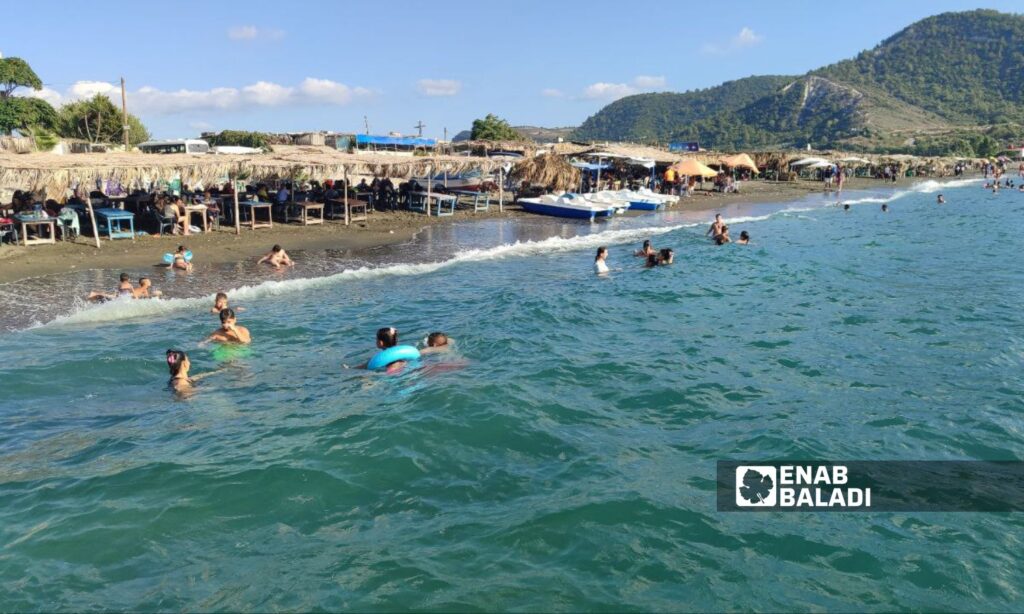Latakia – Enab Baladi
Near the popular Wadi Qandil beach in Latakia, there are several chalets owned by expatriates or locals who rent them out for the summer, after assigning the task to an investor, according to the manager.
Enab Baladi’s reporter, posing as a customer, inquired about rental prices which range between 500,000 and 2 million Syrian pounds per day.
The manager, who goes by the name “Abu Ali,” stated that the rent for a one-bedroom chalet with a bathroom and a small kitchen costs 500,000 pounds per day. If the chalet has two bedrooms, the rent rises to 1.5 million Syrian pounds. There are also three-bedroom chalets, whose nightly rent is 2 million pounds.
Electricity is not available in the chalets, but there is a battery and fans that run on it, in addition to a gas cylinder with full kitchen supplies like those found in every home.
Abu Ali, trying to entice the rental, added that the season is nearing its end, allowing for some price flexibility, simply stating, “We can negotiate when you decide to book.”
As the tourist season in Latakia approaches its end, rental prices for some chalets have dropped by 30 to 50%, but these prices still exceed the capabilities of employees and ordinary people. Syrians are living in a deteriorating economic and living condition, with the minimum government salaries in regime-controlled areas around 279,000 pounds (18 USD).
Even popular beaches are expensive
Public beaches provide an opportunity for the general public to visit, away from the high fees of resorts in Latakia governorate. Wadi Qandil beach is one of the few in the governorate that has not been fully invested in yet, leaving the public with a chance to visit.
However, visits are limited to people from nearby areas because of high transportation costs, as in the case of Mrs. Ibtisam (47 years old) from the nearby village of al-Sarskeya, who came with her family on September 13th, using the bus her husband drives.
Although Wadi Qandil beach is no more than eight kilometers from their village, they have only visited it four or five times this year. This is considered very little for those close to the coast. On holidays, her husband is busy with tourist trips to provide for household needs, while tourism remains a luxury, according to Mrs. Ibtisam.
Ibtisam brought all the necessary food, za’atar sandwiches and some fruits in addition to a box of cheese and several loaves of bread, so the family wouldn’t bear extra food costs during the outing. She mentioned that barbecuing during trips is non-existent and belongs to the “good old days.”
Swimming in some areas of Wadi Qandil beach is free, while renting a table with four chairs costs 100,000 pounds on regular days, rising to 150,000 pounds on holidays. It is possible to negotiate with the investor to lower the fee by about 25,000 pounds if the family does not plan to stay long.
A wide popularity
Wadi Qandil beach has gained wide popularity among many Syrians due to photos of its beach, which combines mountains and the sea, being posted on Facebook. It has become a preferred destination for many domestic tourist trips and even some expatriates returning from abroad.
While internal tourist trips choose popular beaches due to their lower costs, expatriates prefer the resorts on the beach that provide electricity and all other services around the clock. Unlike the popular beaches, which often lack designated bathroom areas, and if available, their filthiness drives many away.
Wadi Qandil beach is about 25 kilometers from Latakia city, and it is difficult to reach by regular transportation. A tourist might spend half their day waiting for a bus to take them back and forth.
Moreover, the beach is about a 20-minute walk from the main road, and most beachgoers like to stay until late, making returning by regular means impossible since they stop operating around six in the evening. Taxi fares from Latakia to Wadi Qandil range between 150,000 and 200,000 pounds, so the tourist will pay 400,000 pounds just for transportation.
According to the Director of Tourism in Latakia, Fadi Nizam, the current tourist season has positively impacted all sectors in the governorate.
Nizam told the local Tishreen newspaper that the occupancy rate reached 100% in some tourist facilities, which encouraged the opening of new ones.
According to a report by Enab Baladi last July, the costs of popular tourism in Latakia are about two to three times the government salary for a family, while in other resorts, they are ten times higher.

